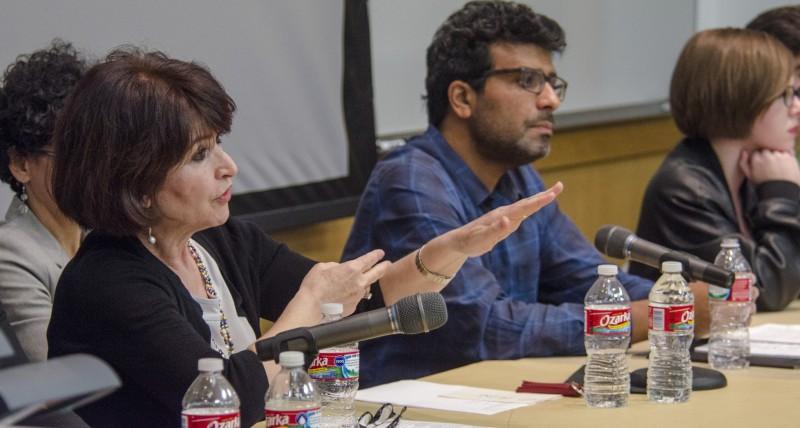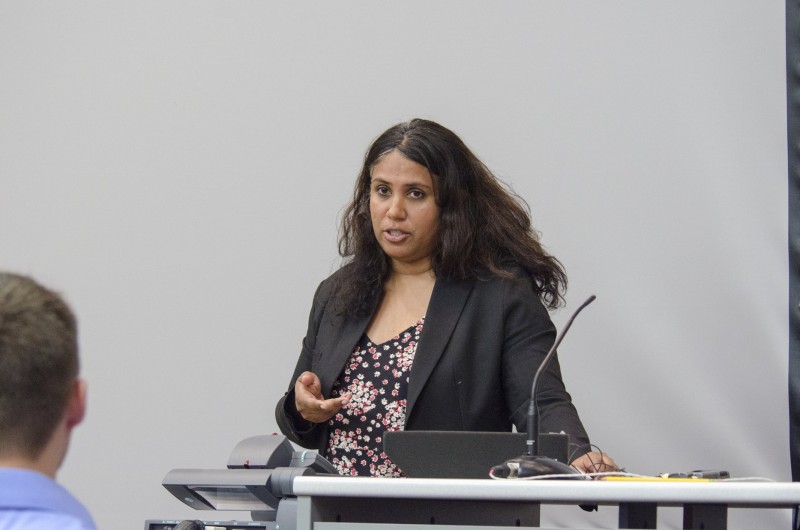On Wednesday, Oct. 22, Trinity’s department of religion hosted a panel about the Islamic State in Iraq and Syria (ISIS).
The panelists were Habiba Noor, visiting assistant professor of religion; Tahir Naqvi, assistant professor of sociology and anthropology and urban studies; and Sussan Siavoshi, chair and Una Chapman Cox distinguished professor of political science.
Student panelists were Andrew DuBois, a senior majoring in international studies with a focus in the Middle East; Adam Lallani, a junior majoring in business; and Lauren Schroeter, a senior double-majoring in religion and geology.
The discussion began with a presentation by DuBois regarding the background of ISIS. He pointed out that the name ISIS stems from a translational error from Arabic and that the Arabic word leaves room for interpretation.
DuBois defined the organization and established its goal.
“ISIS is a Sunni extremist militant organization that is seeking to reestablish an Islamic caliphate in the Middle East,” DuBois said.
DuBois explained that the group originated in the post-2003 invasion of Iraq, when the regime of Saddam Hussein was toppled, which allowed Sunni militant extremist organizations to find “fertile recruiting ground to establish a new organization with fresh, new membership.”
DuBois then outlined the conditions that allowed the Islamic State to gain power and showed a map that presented ISIS’s plan for expansion outside of Iraq and Syria.
He ended his presentation with the background of the current leader of ISIS, Abu Bakr al-Baghdadi, and explained that ISIS is the most well-funded terrorist organization in history.
“This is due to private donors from the Gulf Council or the gulf regional states such as Saudi Arabia and Kuwait; oil sales (from captured reserves from both the Syrian government on the black market and smuggled across international borders); and mafia-like extortion of local business owners for security fees,” DuBois said.
Next, Noor began her presentation by saying that discussion of ISIS in the religion courses she teaches stimulated the idea for the panel.
“I don’t know if it’s appropriate for us to just focus our religion course on this topic because it is an interdisciplinary issue,” Noor said. “I thought it was essential to open up the conversation to the rest of the campus””to bring in others””because I know everyone has questions.”
She went on to say that the United States is officially at war with this organization, even though it may not feel like it to U.S. citizens, and then pointed out the problems of representation when talking about ISIS.
“The Islamic State is the name they have given to themselves. This is important because when you are putting the word Islamic to the association, then you are creating some assumptions as to what Islam is, and to give them that name is to give them that identity,” Noor said.
She pointed out that in some countries like France, the media has decided not to refer to the organization as ISIS. Instead, they are referred to as DAESH, which is the Arabic acronym that means “one who crushes something under foot.” According to Noor, it is seen as a derogatory term and the members of the organization do not appreciate it.
“The Islamic State calls itself the Islamic State because it is how they see themselves. It reflects more of their aspirations, less of a reality. It is a reflection of an aspiration,” Noor said.
Noor also explained that the goal of the organization is to reestablish a caliphate and establish a strict Muslim society that is under Islamic law. However, Islamic law is very diverse, and the Islamic State’s particular version is quite narrow.
“Furthermore, they are very much inspired by early Muslim civilization and they are very much against Western secularism and even Arab nationalism,” Noor said.
She also said that since the death of the prophet Muhammad, there has been dispute over leadership of the followers of Islam.
“What ISIS does is it tries to create the imagined past that is ideal where the Muslims were guided under this one caliph that everyone accepted,” Noor said.
In 1924, the Turkish president abolished the caliphate in an attempt to modernize and secularize Turkey.
“This had an impact on Muslim populations worldwide, especially those living under colonial rule, particularly Muslims in British India and elsewhere. They saw the end of the caliphate as an assault on the Muslim world. Since then, there have been groups that have been seeking to revive the caliphate,” Noor said.
She ended her presentation by pointing out that this is not universal and that a majority of Muslims would say that there is no point to restoring the caliphate. Siavoshi presented next and went farther back in history to argue that the creation of ISIS is not a unique phenomenon. She started with a recap of World War I and explained that the Ottoman Empire joined the Allied forces under the assumption of an Arab state at the end of the war.
However, “At the end of WWI, the agreement of a unified Arab state was dead and what happened was that today’s Iraq went under the control of Great Britain and today’s Syria went under the control of France. These borders were ultimately arbitrarily drawn, but what is important is, because of the borders, there was an inherent instability in these states,” Siavoshi said.
She then pointed out the two catalysts that actualized the instability of this region from the 2003 invasion and protests in 2011.
“One was a violent invasion of Iraq in 2003, which took care of a dictator but also led to a failed state. The other catalyst was 2011 in Syria, when the protests started that led ultimately to civil war and a failed state,” Siavoshi said.
Siavoshi highlighted other points in history that showed that the creation of the Islamic State is not a unique phenomenon and ended by saying, “If ISIS is ever going to go [away], it has to be to the rejection of people who are under its control. That’s the only way it can happen because it’s already in charge of certain territories.”
Naqvi followed with a presentation regarding the future of ISIS and the importance of infrastructure.
He started with a story of shopkeepers in a territory controlled by ISIS who were protesting ISIS because the organization limited their use of electricity.
“This took ISIS by surprise from what I have read, and in a sense it was something new. It was not a resistance to their ideological claims nor was it a resistance to the moral authority, but rather it was something like a protest rooted in infrastructure and the everyday demands of life,” Naqvi said.
He then pointed out that ISIS does seek to control and therefore aspires to govern territory. This means that there is mobilization on the ground and that ISIS sees itself as an administrative as much as an ideological body.
“There are a set of activities, a set of relationships, a set of demands that are being made, not in the context of a resistance to extremism, but in the context of the ruff and tumble of everyday governance,” Naqvi said. “It tells us something important, the fact that ISIS is thinking like a state.”
Naqvi then questioned how the U.S. should engage in a movement like this.
“If we are to start thinking of ISIS as a state, I think it is crucial to not just think of the state as seizure of territory. There is something that happens after that. It is ongoing; it is already happening, and it does have to do with the stuff of everyday life, because when you protest for not doing a good job of governing, you’re recognizing someone as a state,” Naqvi said.
The panel presentations concluded with Schroeter and Lallani discussing a fatwa established by 126 individuals. A fatwa is a rule on Islamic law by a recognized authority. According to this fatwa, it is forbidden to kill innocents and emissaries.
“It is unlawful to kill someone who does not pose a threat, yet ISIS kills many noncombatants and unarmed people,” Schroeter said. “Furthermore, they have made many headlines for killing journalists from multiple places in the world, and the fatwa states that journalists should be considered emissaries of truth.”
The fatwa does justify the killing of non-Muslims, but “ISIS commits violence against Arab Christians and other people of the scripture, which according to the Qur’an, people of the book are to be protected,” Schroeter said.
Lallani argued that ISIS is hypocritical.
“Islamic extremists have a tendency to try and defend their actions by utilizing specific passages in the Qur’an and hadiths but in reality, the actions they are defending coincide with the fact that they are not fully justified because extremists fail to take into account the full context of the Qur’anic verses and hadiths,” Lallani said.
The fatwa also states that women are to be treated equally, yet ISIS treats women as if they are prisoners and gives them very few rights. Lallani concluded by denouncing the leader of ISIS as a caliph.
“The fatwa proclaims that it is forbidden in Islam to declare a caliphate without consensus from all Muslims, and al-Baghdadi has proclaimed himself as a caliph, which is not a valid point to establish himself as a caliph.”
The panel discussion ended with a question-and-answer session with the audience.
Noor, who organized the panel on her own initiative, felt that the panel was successful.
“I think the panel was a success on many levels. The diversity of voices on the panel from the different political perspectives helped with what’s happening on the day-to-day understanding of the events,” Noor said. “I also think it was successful because it was so well attended without a great deal of publicity, and I think that really speaks to the students. I would have been happy if it had just been my two Qur’an classes and maybe a few other people, but I think it was pretty clear that most students just really wanted to know.”








